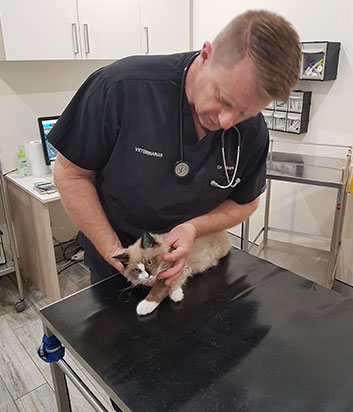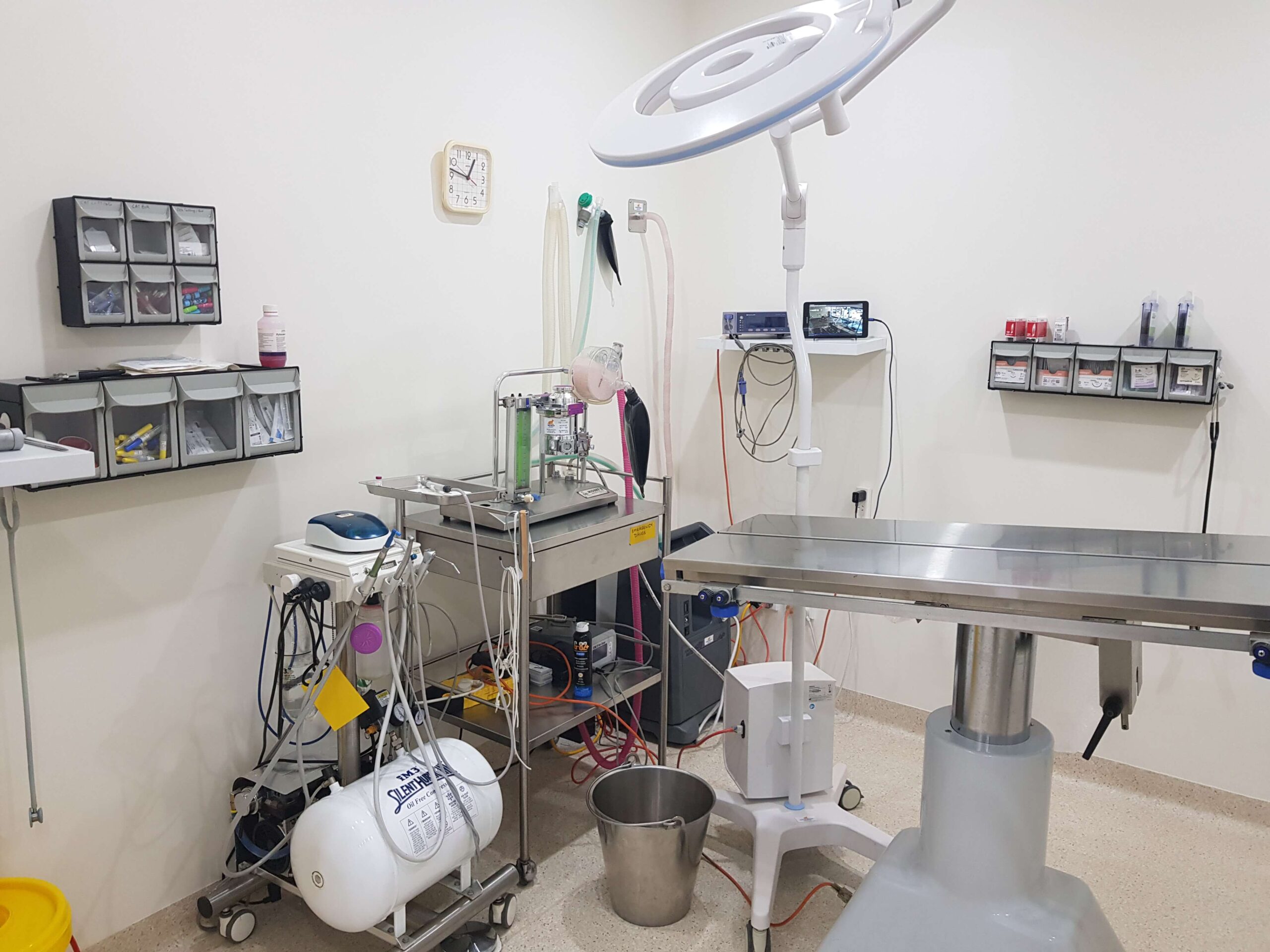The Vet Stars difference
We understand your pet needs to be treated as a ‘star’ and that you want the best for them. Our range of Vet Star services include:
Desexing
Come in and chat to us about the best time to desex your puppy or kitten.
Vaccination
It is highly recommended that dogs and cats receive annual vaccinations.
Heartworm Prevention
We recommend the yearly heartworm injection.
Dental Care
Prevention is better than cure! This old saying applies to pets as much as it does to people.
Obesity Management
We have a range of effective solutions and recommend Royal Canin premium diets.
Fleas, Flies and Ticks
We normally recommend Bravecto, as our experience is that it achieves the best results.
Arthritis Management
Osteoarthritis is a common problem in dogs and probably more common in cats than people realise.
Radiology
Vet Stars Veterinary Clinic has its own X-ray facilities.
Anaesthesia
Anaesthetics are conducted with extreme care.
Stray Animals and Injured Wildlife
Stray dogs and cats must be taken to the local pound.

Desexing
All animals that are surgically desexed here receive analgesia BEFORE and AFTER the procedure. We usually recommend that these animals are placed on intravenous fluids for their surgery.
Please phone the clinic for an estimate of the cost of desexing your pet.
Vaccination
Dogs: We routinely recommend vaccination of adult dogs with a “C7”. This will protect against Parvo, Distemper, and kennel cough, Lepto and Canine Coronavirus. The Macarthur district is a relatively high risk area for the often deadly Parvovirus Disease, and effective vaccination needs to be started from 6 weeks of age, and maintained throughout life.
Puppies will receive a course of three primary vaccinations, at 6, 9 and 12 weeks of age. We believe this is the ideal regime for affording optimal protection. The 6 week vaccine is a C3, at 9 weeks they receive a C7 and at 12 weeks a C5, along with their first heartworm injection.
Cats: Given the high number of Feline AIDS cases seen at this practice, we routinely recommend that cats are protected with a “F3+FIV” vaccine. This includes protection against Feline Flu, Feline enteritis and Feline Immunodeficiency Virus (FIV). If the cat is an adult and not currently protected against FIV, then it is necessary for us to conduct a quick in-house blood test, to first check that they do not already carry the virus. Then an extra two FIV vaccinations are required at one month intervals, following the initial F3+FIV vaccine. We do not charge consultation fees on the follow-up FIV vaccinations, to encourage owners to have their cats protected against FIV.
Kittens are usually given a primary course of three or sometimes four vaccines, depending on when they started their shots, and what they had been protected against.

Heartworm Prevention
Heartworm disease has traditionally been a problem in the Macarthur region. This nasty disease, mainly affecting dogs, is spread by mosquitoes. Areas close to rivers, such as Camden and Macquarie Fields are considered to be an even higher risk.
The advent of effective preventative products, in particular the heartworm injection (SR-12), has brought about a steady decline in the number of clinical cases of heartworm disease. This is obviously a good thing. However, it is strongly recommended that dogs are given the annual heartworm injection, which we can start as young as 3 months of age. Other products are also available, such as monthly preventatives like Comfortis Plus with Simparica Trio.
We recommend that Ferrets be placed on heartworm prevention, and small doses of the spot-on Advocate are ideal for this purpose.

Dental Care
Prevention is better than cure! This old saying applies to pets as much as it does to people. It certainly applies to dental care. WE are strong advocates of feeding raw bones to dogs AND cats. It is best to start this habit from a young age – 6 weeks old, in fact. Probably the best bones are chicken bones, because they are soft and less likely to chip teeth.
BUT THEY MUST BE GIVEN RAW!
We always see clients recoil when we tell them to feed their animals raw bones (especially chicken bones) – it is a widely held misconception that they are dangerous. Given in moderation, 3-4 times weekly and part of a balanced diet, they are an excellent addition to the diet of any healthy dog or cat.
It is no coincidence that raw bones are discussed in the dental section. The appropriate feeding of raw bones will go a long way to preventing dental tartar and the associated problems that this will cause. Dental disease, if left unchecked, will ultimately cause damage to the heart and kidneys, not to mention the horrible smell and loose teeth!
We have the ability to treat dental disease, when it does occur. We have a state-of-the-art ultrasonic scaling machine, as well as a polishing apparatus. We also possess pneumatic dental drilling equipment for use where needed.
Animals undergoing any dental procedures will require a general anaesthetic.
Obesity Management
Along with dental disease, obesity is probably the biggest preventable problem we see in this practice. If your dog or cat is overweight, you can expect to be spending a lot more money at the Vets!
Along with regular raw bones, we generally recommend a good brand of commercial dry food be given on a daily basis. You get what you pay for, and this certainly applies to pet food.
Don’t expect to buy a 20kg bag of dog food for $20 at the service station and have a healthy dog!
We stock and recommend the Royal Canin range of premium and prescription dog and cat foods.
If your pet is overweight, start by eliminating the feeding of table scraps. Table scraps are often fatty. Stick to a set amount of a good brand of dry food on a daily basis, and don’t forget the raw bones for dental health. We can arrange a prescription diet for obese animals and conduct follow up weight checks.

Arthritis Management
Osteoarthritis (OA) is a common problem in dogs and probably more common in cats than people realise.
Obesity, genetics, age and even weather are factors.
Depending on the particular situation we will consider a multi-faceted approach to the problem. Anti-inflammatory drugs are certainly very effective, and usually form part of the treatment. Weight loss is important. Nutriceutical medications such as glucosamine may also form an effective part of the management of osteoarthritis. We also have a course of injections available, which help to regenerate and repair damaged cartilage, and these injections are more often than not very helpful.
We are also very excited to be able to offer some new generation OA treatments for dogs and cats that are given monthly, are affordable, have few side effects and have been shown to be extremely effective.
Fleas, Flies and Ticks
Fleas are a major problem for most of the year, even during winter. Effective control essentially involves regular hot washing of any bedding and an effective topical flea product. We normally recommend Bravecto, as our experience is that it achieves the best results. Some people prefer ADVANTAGE and that has traditionally also been reasonably effective. Don’t even bother with the cheap supermarket brands; including rinses, shampoos and spot-ons as they are only effective for a few days at best.
Ingleburn is not a paralysis tick area, although we have seen them appear on dogs very occasionally in areas near the river, especially Douglas Park. We do not routinely recommend tick prevention unless the dogs or owners visit coastal areas. BRAVECTO is probably the pick of the available tick products. Advantix top-spot can also be used for prevention of tick infestation.
Some dogs are hounded by biting flies during the warmer months. This can often lead to a nasty dermatitis, especially on the tips of the ears. ADVANTIX will help repel these flies. There are also a number of creams available.
Radiology
Vet Stars has its own X-ray facilities.
Anaesthesia

